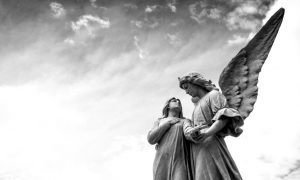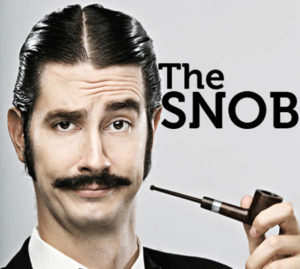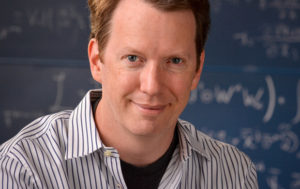If you've never heard of Derald Cochran before reading this article about him, don't feel bad. He isn't famous. But if Derald Cochran's story is true, his life was literally saved by an angel. Derald had been racing full speed down the path to his own destruction, abusing both alcohol and drugs after his younger brother Mike was murdered and set on fire in a drug deal gone bad. He was raging out of control. "I had a lot of hate," Derald says. "I reeked in hate. It radiated from me. My eyes were black, from what I've been told by people who knew me." After a five day non-stop binge of partying, Derald found himself "on my hands and knees on the floor puking up blood. Then all of a sudden I felt a warmth, an incredible warmth all over me." From an incredibly bright light, Derald claimed that he saw the figure of an ethereal being emerge. Then he heard a voice say, "You have been chosen to be a light unto others." Derald's reaction was fairly typical for a nonbeliever of the supernatural or spiritual phenomena. "I knew then I'd finally flipped," he said. "I'd lost it. Gone right over the edge. The next thing I remember was this incredible feeling of peace." Once upon a time, Derald Cochran had lost his own biological children to children's services. After his transformative experience, he became a foster parent and even adopted a child. Once an alcoholic and drug addict, Derald Cochran eventually served on the board of directors for BARN, the Bangor Area Recovery Network. Police officer James Owen, who knew Derald before his life changed, said, "He was a … [Read more...]
The problem of evil
A headline at The Drudge Report made an absurd claim: "Mankind's belief in evil 'caused by disease'." The headline of the actual article in the UK Daily Star was slightly more ridiculous--it prefaced the unbelievable claim with "Scientists discover..." Both headlines are nothing more than click-bait; the substance of the article doesn't come remotely close to justifying the claims of that sensational headline. In fact. if you actually bother to read the article found at the Daily Star claiming that "Scientists discover mankind's belief in evil caused by disease" what you, the reader, will discover is that scientists haven't said they have discovered any such thing. The only thing Brock Bastian and his team of researchers from the University of Melbourne have actually said is that there seems to be some sort of correlation between geographic locations where diseases were known to be more common and a cultural belief in the existence of demons and evil spirits. Once you get into the real "substance" of the article, you'll find the bold declarations have been considerably watered down by the use of all sorts of conditional words...the backpedaling begins with the article's subtitle that says "A potentially-massive breakthrough in our understanding of evil may have been found." Well, which is it? Has this amazing breakthrough been found, or hasn't it? You won't know for sure unless you read beyond the headline. The headline itself is nothing more than a hook to lure readers into learning about what amounts to simply a secular version of a false cause fallacy based on a … [Read more...]
The conceit of belief
A recent article I wrote titled "Anecdotes versus evidence" tried to explain the difference between an interesting story with an extraordinary claim and real evidence of a phenomena obtained via the scientific method. Quite predictably, there was a critic lurking on social media who wanted to challenge the crux of the article without bothering to evaluate the content. In the article I had listed three specific examples of extraordinary claims that apparently could be evaluated using credible scientific evidence proving beyond reasonable doubt that strict materialism was false, and that the metaphysical mind can learn new information even when temporarily separated from the physical brain. The idea behind writing the article was to provide the information and people who disagreed with me could fairly evaluate the same evidence and argue my interpretation of what the evidence meant. This critic merely assumed the evidence to which I referred was no better than any other alleged evidence he'd ever seen, and refused to look at the evidence I had offered. Instead, he wanted to challenge my methodology so he could downgrade the evidence back to only anecdote. My answer was quick and easy: I had actually looked at the evidence. I didn't just make an assumption. The direction of his line of inquiry soon became clear: my critic wanted me to acknowledge that I was simply taking the word of witnesses as gospel truth without questioning their veracity. That will only work if we apply the same standard in every situation. How do we know anything is true? The reality is … [Read more...]
Anecdotes versus evidence
A strict materialist believes that our existence is limited to our physical bodies. They do not believe in God, Satan, heaven, hell, life after death, the near death experience, ghosts, angels, demons, spirits, souls, or any sort of supernatural phenomena. Not every atheist is a strict materialist, but by definition, strict materials are always atheists. To which I say, fine. Believe whatever you want, because you have free will. It isn't my job nor my responsibility to change your mind. As long as you can refrain from making any claims about the superiority of your beliefs over mine, we'll get along just fine. When a strict materialist makes an epistemic claim, it is typically their own personal belief incorrectly presented as fact. Whenever that situation occurs, I must offer strenuous objections because anecdotes should never be confused for scientific evidence and of all people, the strict materialist should already know this because they've told me as much on countless occasions. Personal beliefs should never be argued to be indisputable facts. Anecdotes might be interesting stories, but they will never be evidence to you unless they are your stories culled from your own personal experience and observation. If I tell you that I saw something, it's merely an anecdote. However, if you personally witness an event, it is your personal experience, and observation is a key component of the scientific method. Conversely, if you tell me that you saw something, it is still only an anecdote. However, if I observe the same thing you do, I have become a corroborating … [Read more...]
Vincible Ignorance
Physicist Sean Carroll An article at American Thinker about conspiracy theories and the moon landing caught my attention when the term vincible ignorance was introduced and defined as the "stubborn resistance to the truth and refusal to accept it, no matter how overwhelming the evidence in its favor is." Coined with the intention of being applied to various positions on Catholic dogma, the terminology has useful application in a more secular context. Invincible ignorance has been defined as an unknown that can never be known. A secular example of invincible ignorance might be the conditions that existed prior to the Big Bang singularity--we "know" the universe had an origin because we've been told evidence for the Big Bang exists, called redshift and cosmic microwave background radiation (CMB). The consensus of physicists (although consensus is not science) is that a very small, highly condensed dot of material rapidly expanded to become this universe. We don't know what existed prior to the Big Bang. We can only guess and speculate. It would be an example of vincible ignorance to know about redshift and CMB evidence and still reject the Big Bang evidence in favor of the steady state (eternal, unchanging universe) hypothesis. While similar to the phrase I began using a while ago, the subtle difference between vincible ignorance and willful ignorance is knowing and rejecting the truth as opposed to simply avoiding it. The distinction appears to be useful, to be sure. For example several years ago, while participating on an internet panel to discuss his … [Read more...]




